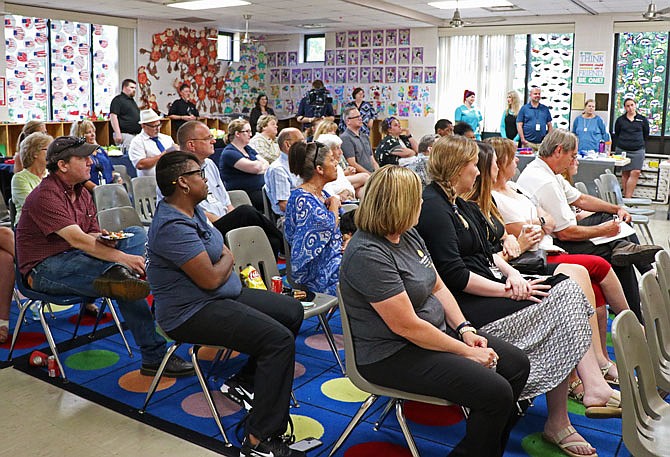People who attended Thursday evening's program on trauma left determined to cope with - or help others cope with - trauma associated with recent Mid-Missouri disasters.
Josh Varner, a social/emotional counselor and coach, presented "Coping with Disaster," to about 40 people Thursday evening.
The program was meant to help listeners come to terms with trauma and post traumatic stress and to promote their mental wellness after flooding and the May 22 tornado that struck Central Missouri. Some listeners attended so they would be able to take what they learned home and possibly help others affected by the weather.
It was also intended to help listeners identify traumas people too often face.
"Sexual abuse is rampant," Varner said.
It affects between one out of every three or four girls in the United States before they're 18, he said.
A father of two daughters, Varner said that was the scariest stat in the world to him. Boys aren't faring much better, he added. Between one out of every five or six boys is a victim of sexual assault.
"I hear educators say all the time 'What's wrong with our kids today?' Look at those base numbers, and their behaviors make a lot of sense," Varner said.
Boys typically don't tell anybody for more than 20 years, and ninety percent develop alcohol addictions, he said.
There is domestic violence in one out of every four homes in the United States.
Varner explained acute trauma, which is generally a one-time event, like a tornado or car accident, would be easier to deal with than chronic trauma. Chronic trauma occurs following multiple events.
Complex trauma is the most difficult to deal with and oftentimes occurs when the trauma is happening at home.
"We're all mammals here. We want to go to our safe place (at the end of the day)," Varner said. "If you're a child and there's domestic violence going on in your home, when do you ever get to calm down?"
Helping people calm down begins by recognizing where they are, he said. Severe trauma causes their brains to trigger survival instincts - a fight, flight or freeze response. When someone has those reactions (which come from the back of the brain), they are unable to process and reason (which comes from the front of the brain), Varner said.
He said to respond to an upset person, listeners should ask themselves, is the person in the front or the back of the brain?
He could be in a confrontation with a student at a school.
"As soon as I recognize that they're in the back of the brain, that helps keep me calm," Varner said. "It's not personal anymore."
It's the hardest thing to do as a parent, he continued.
Calm creates calm and chaos creates chaos.
People in the back of their brains can't understand consequences and can't understand what they just did, so that's not the time to change behavior. People still need to be held accountable, he added.
"Get help if you need to," Varner said.
And go "slow and low." Maintain a non-threatening body posture, he said.
"If we can talk quietly, if your body is less threatening," Varner said, "if we use as few words as possible, because the brain can't process as fast, that's when were going to be able to calm people down."
Laurel Kramer, a psychologist at the St. Mary's Hospital outpatient behavioral health clinic, introduced Varner to his listeners inside the Jefferson City Area YMCA, Knowles Center Annex Building, 424 Stadium Blvd.
Following the tornado, a group of mental health professionals discussed what might be done down the line following the disaster. They understood, she said, the daily checkup call or knock on the door would eventually go away.
"I'm very aware of what's happened and how it's turned lives upside down," said Kramer, who lives near the tornado's path. "To me, this tornado is like a death in the family - a major person."
It's like when a mother or father of a child dies. Or, when the spouse of an adult dies, she said.
"The first couple of days, you're in shock," Kramer said. "You think, 'This can't have happened.' And, 'Oh, my God, what do I do?'"
People come forward with food and help and all sorts of things. Then, the funeral happens, and you're still in shock, she said. As the weeks go on, the support kind of dwindles away.
"People stop calling and people stop checking in," Kramer said. "That's when depression hits. And, that's about where we are right now with the tornado process."
It's created a "big, grieving mess" for the community.
Some people still don't have stable housing, she said. Buildings continue to be torn down. Trees are being removed. The community is still in a crisis. The help centers are closing. People affected by the disasters still need help.
"But life has moved on," Kramer said. "It's moved on for a lot of people in the community."
And, she said, the program was intended to continue connecting people whom the disasters affected with mental health services they need.
It is scheduled to repeat tonight at Eldon High School, 101 S. Pine St.

